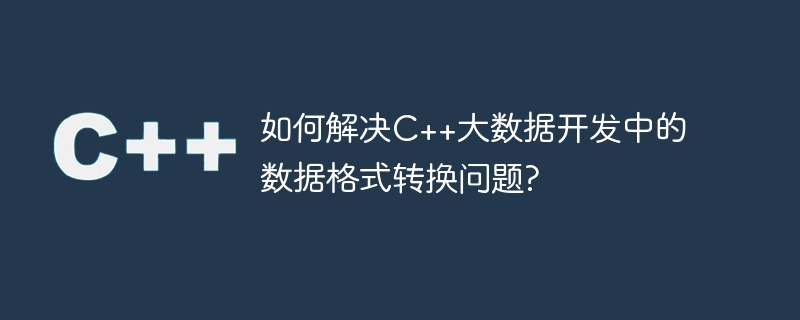
如何解决C++大数据开发中的数据格式转换问题?
在C++大数据开发中,数据格式转换是一个常见的问题。不同的数据格式之间的转换需要通过一些特定的处理步骤来完成。本文将介绍一些常见的数据格式转换问题,并提供相应的解决方案。
在大数据处理过程中,经常需要将字符串转换为数字类型进行计算。C++中可以使用标准库函数stoi和stof来实现字符串到整型和浮点型的转换。
#include <iostream>
#include <string>
int main() {
std::string str = "123";
int num = std::stoi(str);
std::cout << "转换后的数字为:" << num << std::endl;
std::string strFloat = "3.14";
float f = std::stof(strFloat);
std::cout << "转换后的浮点数为:" << f << std::endl;
return 0;
}与字符串转数字相反,有时候需要将数字转换为字符串类型。C++中可以使用std::to_string函数将整型、浮点型转换为字符串。
#include <iostream>
#include <string>
int main() {
int num = 123;
std::string str = std::to_string(num);
std::cout << "转换后的字符串为:" << str << std::endl;
float f = 3.14;
std::string strFloat = std::to_string(f);
std::cout << "转换后的字符串为:" << strFloat << std::endl;
return 0;
}在C++开发中,字符串和字符数组之间的相互转换也是一个常见的问题。可以使用strcpy函数将字符串复制到字符数组中,使用string的成员函数c_str()将字符串转换为字符数组。
#include <iostream>
#include <string>
#include <cstring>
int main() {
std::string str = "hello";
char charArray[10];
std::strcpy(charArray, str.c_str());
std::cout << "转换后的字符数组为:" << charArray << std::endl;
char charArray2[10] = "world";
std::string str2(charArray2);
std::cout << "转换后的字符串为:" << str2 << std::endl;
return 0;
}在大数据开发中,时间戳与日期时间之间的转换也是一个常见的问题。可以使用ctime库函数将时间戳转换为日期时间,使用strftime函数将日期时间转换为自定义格式的字符串。
#include <iostream>
#include <ctime>
int main() {
std::time_t timestamp = std::time(nullptr);
std::cout << "当前时间戳为:" << timestamp << std::endl;
std::tm* timeinfo = std::localtime(×tamp);
char buffer[80];
std::strftime(buffer, 80, "%Y-%m-%d %H:%M:%S", timeinfo);
std::cout << "当前日期时间为:" << buffer << std::endl;
return 0;
}以上是几个常见的数据格式转换问题及相应的解决方案。在实际开发中,我们还会遇到更加复杂和特定的转换需求,这需要根据具体情况进行相应的处理和转换。
总结起来,数据格式转换在C++大数据开发中是一个常见的问题,但有很多现成的解决方案可供使用。掌握这些转换技巧,能够更高效地处理和转换不同的数据格式,提高大数据开发的效率。
以上是如何解决C++大数据开发中的数据格式转换问题?的详细内容。更多信息请关注PHP中文网其他相关文章!




